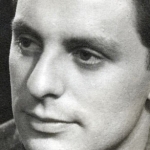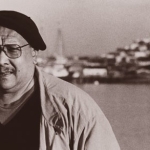1.
After the sweet promise,
the summer’s mild retreat
I come to this white office, its sterile sheet,
its hard tablet, its stirrups, to hold my breath
while I, who must, allow the glove its oily rape,
to hear the almost mighty doctor over me equate
my ills with hers
and decide to operate.
It grew in her
as simply as a child would grow,
as simply as she housed me once, fat and female.
Always my most gentle house before that embryo
of evil spread in her shelter and she grew frail.
Frail, we say, remembering fear, that face we wear
in the room of the special smells of dying, fear
where the snoring mouth gapes
and is not dear.
There was snow everywhere.
Each day I grueled through
its sloppy peak, its blue-struck days, my boots
slapping into the hospital halls, past the retinue
of nurses at the desk, to murmur in cahoots
with hers outside her door, to enter with the outside
air stuck on my skin, to enter smelling her pride,
her upkeep, and to lie
as all who love have lied.
No reason to be afraid,
my almost mighty doctor reasons.
I nod, thinking that woman’s dying
must come in seasons,
thinking that living is worth buying.
I walk out, scuffing a raw leaf,
kicking the clumps of dead straw
that were this summer’s lawn.
Automatically I get in my car,
knowing the historic thief
is loose in my house
and must be set upon.
2.
Clean of the body’s hair,
I lie smooth from breast to leg.
All that was special, all that was rare
is common here. Fact: death too is in the egg.
Fact: the body is dumb, the body is meat.
And tomorrow the O.R. Only the summer was sweet.
The rooms down the hall are calling
all night long, while the night outside
sucks at the trees. I hear limbs falling
and see yellow eyes flick in the rain. Wide eyed
and still whole I turn in my bin like a shorn lamb.
A nurse’s flashlight blinds me to see who I am.
The walls color in a wash
of daylight until the room takes its objects
into itself again. I smoke furtively and squash
the butt and hide it with my watch and other effects.
The halls bustle with legs. I smile at the nurse
who smiles for the morning shift. Day is worse.
Scheduled late, I cannot drink
or eat, except for yellow pills
and a jigger of water. I wait and think
until she brings two mysterious needles: the skills
she knows she knows, promising, soon you’ll be out.
But nothing is sure. No one. I wait in doubt.
I wait like a kennel of dogs
jumping against their fence. At ten
she returns, laughs and catalogues
my resistance to drugs. On the stretcher, citizen
and boss of my own body still, I glide down the halls
and rise in the iron cage toward science and pitfalls.
The great green people stand
over me; I roll on the table
under a terrible sun, following their command
to curl, head touching knee if I am able.
Next, I am hung up like a saddle and they begin.
Pale as an angel I float out over my own skin.
I soar in hostile air
over the pure women in labor,
over the crowning heads of babies being born.
I plunge down the backstair
calling mother at the dying door,
to rush back to my own skin, tied where it was torn.
Its nerves pull like wires
snapping from the leg to the rib.
Strangers, their faces rolling lilke hoops, require
my arm. I am lifted into my aluminum crib.
3.
Skull flat, here in my harness,
thick with shock, I call mother
to help myself, call toe to frog,
that woolly bat, that tongue of dog;
call god help and all the rest.
The soul that swam the furious water
sinks now in flies and the brain
flops like a docked fish and the eyes
are flat boat decks riding out the pain.
My nurses, those starchy ghosts,
hover over me for my lame hours
and my lame days. The mechanics
of the body pump for their tricks.
I rest on their needles, am dosed
and snoring amid the orange flowers
and the eyes of visitors. I wear,
like some senile woman, a scarlet
candy package ribbon in my hair.
Four days from home I lurk on my
mechanical parapet with two pillows
at my elbows, as soft as praying cushions.
My knees work with the bed that runs
on power. I grumble to forget the lie
I ought to hear, but don't. God knows
I thought I’d die—but here I am,
recalling mother, the sound of her
good morning, the odor of orange and jam.
All’s well, they say. They say I’m better.
I lounge in frills or, picturesque,
I wear bunny pink slippers in the hall.
I read a new book and shuffle past the desk
to mail the author my first fan letter.
time now to pack this humpty-dumpty
back the frightened way she came
and run along, Anne, and run along now,
my stomach laced like a football
for the game.






Comment form: